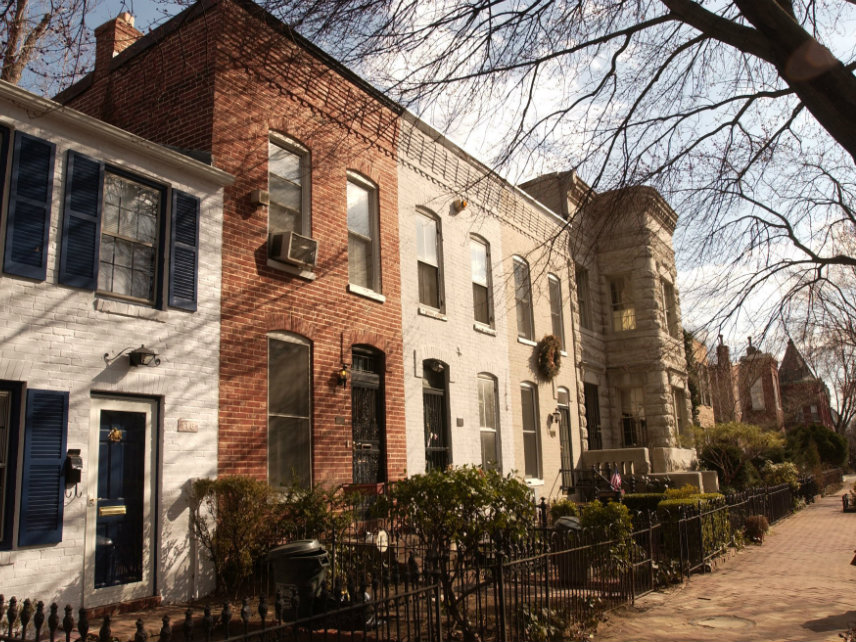D.C. City Council Will Vote to Ban Some Airbnb Rentals Today
Hotels are trying to stop competition from Airbnb, but they're doing just fine.

A longtime resident of the Hillcrest neighborhood in Washington, D.C., Rashida Mims wonders why hotel lobbyists are taking such an interest in her short-term rental income.
After all, there are no hotels in Hillcrest, a roughly mile-wide triangle filled with tangles of residential streets along the far southeast edge of the nation's capital. Mims makes a few thousand dollars off her Airbnb rentals each year, hardly enough to threaten the bottom lines of the hotels chains that are thriving in Washington. Those guests help Mims, who is retired, live a little more comfortably and bring an economic boost to her neighborhood.
But the Washington D.C. City Council is aiming to strike a blow against short-term rentals. A bill sponsored by Council Chairman Phil Mendelson will be given a vote on Tuesday. It would ban residents from renting their space for more than 90 days per year and would ban all rentals of secondary homes—that is, homes that are not occupied by the landlord listing them on services like Airbnb or HomeAway.
It's the latest showdown in a city-by-city struggle that's playing out between powerful hotel chains that see Airbnb as unwanted competition and residents like Mims who make a little extra cash by offering their extra bedrooms and second homes to tourists who want to see a different side of cities.
"The hotel industry wants to thwart any attempt to offer an alternative to staying at a hotel to protect its profits and will work to cut off D.C. residents from earning extra income through our homes to do that," wrote Mims in The Washington Post last week, urging the city council to oppose the effort to restrict short-term rentals.
It's not as if hotels in D.C. need protection. Both the supply of and demand for hotel rooms in D.C. are growing, according to an August report from BizNow, which tracks commercial real estate. There are more than 3,000 hotel rooms under construction in the D.C. area and another 6,000 in planning, which shows that investors are not worried about the long-term viability of the market.
Home sharing competes with hotels, of course, but it's wrong for policymakers to view it as a zero-sum game. Hosts on platforms like Airbnb are responsive to market conditions. They "expand supply as hotels fill up, and keep hotel prices down as a result," report economists at Harvard and the Massachusetts Institute of Technology. That allows more people to travel, generating $276 million in surplus bookings in America's 10 largest cities during 2014 alone, the researchers found.
This is particularly true during times of extremely high demand—in a city hosting the Super Bowl, for example, or on New Year's Eve. Hotels used to be able to charge significantly higher prices on those occasions, but the advent of home sharing has increased the elasticity in a region's supply of sleeping accommodations, allowing additional tourists to visit.
That provides opportunities to residents like Mims. Opportunities that the D.C. city council might revoke on Tuesday.
Last year, Councilman Kenyan McDuffie proposed a stricter Airbnb bill with a 15-day limit on rentals. While Mendelson's current proposal is less severe, it still amounts to revoking the agency of residents, like Mims, who want to earn extra money by renting their private property.
Editor's Note: As of February 29, 2024, commenting privileges on reason.com posts are limited to Reason Plus subscribers. Past commenters are grandfathered in for a temporary period. Subscribe here to preserve your ability to comment. Your Reason Plus subscription also gives you an ad-free version of reason.com, along with full access to the digital edition and archives of Reason magazine. We request that comments be civil and on-topic. We do not moderate or assume any responsibility for comments, which are owned by the readers who post them. Comments do not represent the views of reason.com or Reason Foundation. We reserve the right to delete any comment and ban commenters for any reason at any time. Comments may only be edited within 5 minutes of posting. Report abuses.
Please to post comments


Must be nice having money to throw away
Vote everybody out. Political office was not meant to be a career.
Yep-city councils are every bit as corrupt as Congress. Where I live, its amusing to see these politicians who get so passionate about things like transgender bathrooms and confederate statues act every bit the country club Republican when it comes to sucking corporate dick.
Somebody should explain to the DC city council that protectionism for hotel owners benefits the evil rich - and the evilest, richest hotel owner in DC is Donald Trump.
Progs will never admit that corporate hotel owners and the unions who work for them share the exact same interests. If they are worried about affordable housing, how about converting some of the failed public schools or dog parks to that?
Seems to me that a lot of the people who would use something like AirBnb are the people who can't afford the idiotic high prices charged by big city hotels, and if they don't have that option they just won't come to the city at all, or they'll use a hotel in the 'burbs.
Not everyone who visits a city is a rich lobbyist. But maybe those are the only sort that the D.C. Council folks know.
DC council pick inn industry over mortgage holders. I don't figure the city ought to force any limitations on mortgage holders that need to lease some portion of the home, short or long haul - property proprietor ought to have the capacity to do what they need. It's over-direction, and it's inept to do it at the expense of such considerable duty incomes. I am happy to visit here, I will share you dissertation writing service website to you to check out new techniques of writing.